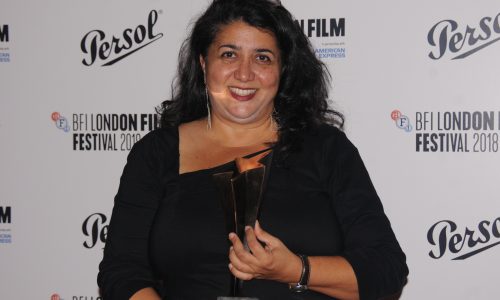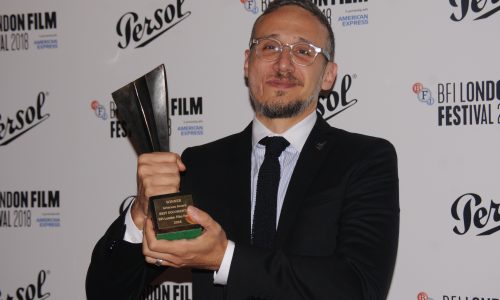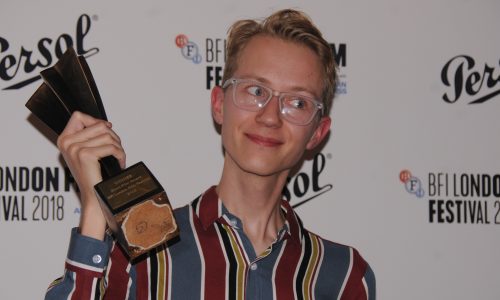A film about the sex-trafficking of African women in Vienna has won the top prize at the London film festival. There were also awards for a film about a transgender ballet dancer and a documentary about race relations in the United States.
Announcing the winners of the BFI London Film Festival Awards, the event’s artistic director Tricia Tuttle noted that not only were they all highly accomplished films but they were all socially and culturally relevant.
Indeed the winners in the three main categories all tackled stories that – one way or another – have featured in news bulletins in recent months – some as recently as this past week.

The Best Film prize went to the Austrian-based director Sudabeh Mortezai, whose second feature, Joy, is about a Nigerian woman who’s working as a sex-slave in Vienna – for a Madame who herself had previously been a sex slave. The director said she was drawn to the story by the vicious cycle of women exploiting other women. She hoped that the award would give more prominence to the subject. “An award like this is just fantastic, you know, because it puts a spotlight on the film. It’s, of course, a tough subject, but an award just makes people more interested to watch it or hear about it.” And she said that awards definitely help film-makers progress in their careers, noting that influential people have been approaching her, particularly because her debut film Macondo was nominated in the London Film Festival’s Best First Film award in 2014. “People really perceive me as a film-maker with an oeuvre, and not just one film.”

In the week that the government’s consultation on the Gender Recognition Act came to a close, the twenty seven year old Belgian director Lukas Dhont won the Best First Film prize for Girl – about a teenaged trans girl and her struggles to become a professional ballet dancer. The film picked up the corresponding award at Cannes and he said global audiences really related to the central theme of our relationships with our own bodies, who we want to be and how we can get there. “It’s a question that’s central to everyone’s lives, so for a very big audience, this is a film that they can tune in to and take something with them.” He said the film was closely based on the real story of a fifteen year old transgender girl that he met as he was about to start film school in 2009. “I was just immediately touched by that story, by a trans girl who chose the truest version of herself, who was very ambitious and didn’t care about the reactions of others. And I thought, ‘Wow, that’s a modern heroin,’ and I wanted to put her on screen and she agreed to start writing the script of the film with me.”

The Best Documentary jury gave its prize to What You Gonna Do When The World’s On Fire – by the Italian film-maker Roberto Minervini, who followed the experiences of an African American community in Louisiana in the aftermath of a series of police shootings of unarmed black men. In the week that The Hate U Give gets its theatrical release in the UK, Minervini said he wanted to reinforce what people around the world have already seen on the news and in other feature films. “I think we need to remind ourselves that if you start tolerating a lesser democracy and lesser justice and lesser tolerance then we are eroding those concepts and I think that concern is expressed all over the world and that’s why I’m back here in London being awarded because people probably feel that we can’t accept a lesser form of democracy where people can get killed and the murderers can get away with murder.” And he explained why he chose documentary as his medium for getting his message across. “Cinema speaks a language that reaches people’s hearts. People are proficient at watching stories and analysing them with their intellect and with their hearts and that’s why I chose to become a film-maker, because I knew it would speak the language of people which is a very democratic way of doing arts.”

These three prizes have been handed out every year since the London Film Festival first staged an Awards ceremony in 2009, but more recently, it’s added an official short film competition to the event. This year’s prize went to the only British winner of the night, Charlie Lyne, for his short documentary Lasting Marks, about a group of sixteen men, convicted twenty five years ago, of having consensual sadomasochistic sex with one another, the suggestion being that they’d assaulted each other. Telling the story using a slide-show of court documents, with narration from one of the men in question, Lyne says the majority of the men went to prison and they spent the next ten years fighting the case all the way to the European Courts, where they lost again. Most shockingly, he says, this case remains legal precedent, so he fears that the same could yet happen again. “Even if we as a culture have become a little bit more accepting, a little bit more progressive, legally they’re in the exact same position that they were.” He hopes that winning this award could raise the profile of this case. “Awards like this are so amazingly helpful for amplifying a film, especially one that’s made on a very small scale like this, so if it can help the film reach more people and get across to people how cases can be brought against innocent, victimless crimes, all the better.”

During the decade that the LFF has been formally staging its competitions, the awards have struggled to earn the reputation of prizes handed out at some of the more established festival competitions. This is partly down to the LFF adopting a different structure to some of the higher profile festivals. Cannes, for example, generally screens about twenty five films, most of which will be part of the competition – all of the films will be world premieres and the audiences will be made up exclusively of industry insiders. But at the London Film Festival, more than 220 features are screened to audiences made up of members of the public, many of them films that have already made waves at other major festivals, and there are only 10 films in competition in each of the main categories. “Every film-maker in the competitive strands is trying to do something a bit different,” notes Tricia Tuttle. “First and foremost, when we think about the competitive films, we think what is the film-maker trying to achieve and have they been successful on their own terms. We want to see adventurous film-making, we want to see a strong voice from the directors and we want to see diversity.” The result is that rather than generating the kind of publicity a Cannes competition film might do, the London Film Festival awards are more about cementing the acclaim for features that have already been feted by juries, audiences and critics around the world. Girl, for instance, won the Cannes Camera d’Or, while Mortezai and Minervini’s films both picked up awards at the recent Venice Film Festival.
In this, the tenth year of the LFF’s formal awards presentations, rather than staging a ceremony, Tuttle wanted to bring the awards – like the festival more generally – to the public, so for the first time, the winning features were screened to audiences who had no idea what films they were going to see until the winners were announced.
